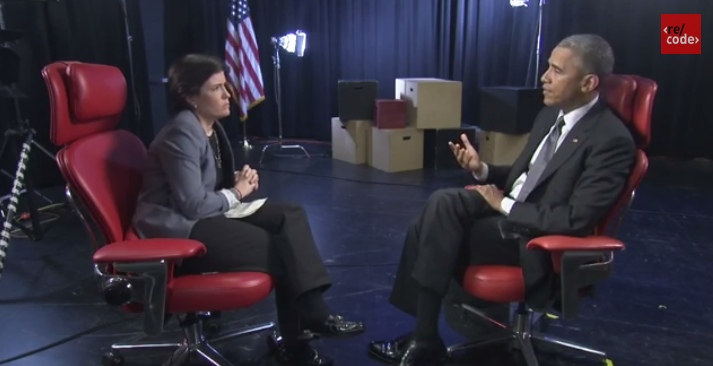At a major summit at Stanford University on Friday, President Obama pressed Silicon Valley companies to join a new national cybersecurity strategy. He sat down with Re/code’s Kara Swisher for a in-depth 25-minute grilling on the major tech issues, including National Security Agency domestic surveillance, immigration, STEM education, and data ownership.
Readers can watch the full video below. We’ve summarized the best parts of the interview below the video.
“I wouldn’t consider them acts of war, but I would consider them acts of property damage, commercial theft that are serious.”
Swisher pressed Obama on whether he considers state-sponsored cyber attacks against American companies “acts of war.” The president evidently doesn’t want to categorize past threats into an issue that might encourage a military response. When Swisher asked him about more dire scenarios of what a cyber attack could do to an American city, the president again deflected the point, but did admit that the American military could respond with their own similar measures.
“I’m a strong believer in strong encryption.”
In response to National Security Agency spying, the major Internet companies are starting to encrypt their data. This worries the president, who argues that it will leave the U.S. technically incapable of investigating a legitimate terrorist threat. Indeed, the president’s British counterpart, Prime Minister David Cameron, wants to ban some of these encryption techniques entirely.
That said, the president made the case that he’s a believer in encryption and is sympathetic to people who want to defend their privacy from the prying eyes of the government. While no specifics were discussed, he’s trying to work with tech companies on some type of happy medium.
He acknowledged that the government hasn’t had a perfect strategy in protecting privacy. “In the case of the NSA, we’re probably a little slow,” Obama admitted. But he made the case that new measures are better at striking the difficult balance between security and privacy (again, no specifics).
“My relationship with Silicon Valley and the tech community historically has been really good. Many of these folks are my friends.”
Despite hiccups due to mass spying and a delayed immigration bill, the president says that his relationship with Silicon Valley is still rock solid.
“What is portrayed as high-minded positions on issues sometimes is just designed to carve out some of their commercial interests.”
Europe has generally been more aggressive against the data collection policies of Google, Facebook, and the big Internet companies. For instance, Germany fined Google for data collected during their mapping process.
When asked why Europe was more strident, Obama argued that it was at least partially motivated to protect their own fledging tech companies. In the past, Europe has funded some competitors to companies like Google, but few if any have matured into serious threats to the dominance of U.S. firms.
“Everybody’s got to learn how to code early … introduce this with the ABCs and the colors.”
Regarding Silicon Valley’s notoriously white maleness, Obama thinks education is the solution. Getting everyone in the pipeline at a very early age is key, he argued. He even encouraged his own daughters to explore the coding game, but neither has really taken to it.
Readers can watch the full video interview above.


